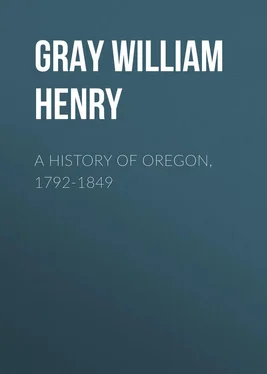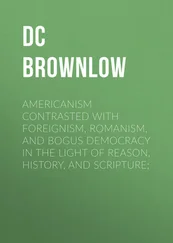William Gray - A History of Oregon, 1792-1849
Здесь есть возможность читать онлайн «William Gray - A History of Oregon, 1792-1849» — ознакомительный отрывок электронной книги совершенно бесплатно, а после прочтения отрывка купить полную версию. В некоторых случаях можно слушать аудио, скачать через торрент в формате fb2 и присутствует краткое содержание. Жанр: literature_19, foreign_antique, foreign_prose, Историческая проза, на английском языке. Описание произведения, (предисловие) а так же отзывы посетителей доступны на портале библиотеки ЛибКат.
- Название:A History of Oregon, 1792-1849
- Автор:
- Жанр:
- Год:неизвестен
- ISBN:нет данных
- Рейтинг книги:5 / 5. Голосов: 1
-
Избранное:Добавить в избранное
- Отзывы:
-
Ваша оценка:
- 100
- 1
- 2
- 3
- 4
- 5
A History of Oregon, 1792-1849: краткое содержание, описание и аннотация
Предлагаем к чтению аннотацию, описание, краткое содержание или предисловие (зависит от того, что написал сам автор книги «A History of Oregon, 1792-1849»). Если вы не нашли необходимую информацию о книге — напишите в комментариях, мы постараемся отыскать её.
A History of Oregon, 1792-1849 — читать онлайн ознакомительный отрывок
Ниже представлен текст книги, разбитый по страницам. Система сохранения места последней прочитанной страницы, позволяет с удобством читать онлайн бесплатно книгу «A History of Oregon, 1792-1849», без необходимости каждый раз заново искать на чём Вы остановились. Поставьте закладку, и сможете в любой момент перейти на страницу, на которой закончили чтение.
Интервал:
Закладка:
This account illustrates English and Hudson’s Bay Company’s dealings with Indians, and their treatment of men and murderers, both among the Indians and their own people.
We are forced to acknowledge that we can not see the correctness of moral principle in Mr. Hine’s conclusions. There was unquestionably a premeditated and willful murder committed by the men at that fort. We can understand the motives of Sir George Simpson and Mr. Douglas, in allowing those men to escape the penalty of their crime, from the amount of pecuniary interests involved, and the personal jealousy existing against Dr. McLaughlin and his sons, in the company’s service. We know of jealousies existing between Mr. Simpson and John McLaughlin, Jr., on account of statements made in our presence at the breakfast-table, that were only settled temporarily, while at Vancouver. These statements, and the placing of this young son of the doctor’s at that post, we are satisfied had their influence in acquitting his murderers, if they did not in bringing about the murder, which to us appears plain in the testimony; and we so expressed our opinion, when the father requested us (while in his office) to examine a copy of those depositions. We have no hesitancy in saying, that we believe it to have been a malicious murder, and should have sent the perpetrators to the gallows. We have never been able to learn of the trial of any one implicated.
CHAPTER VII
Treatment of Indians. – Influence of Hudson’s Bay Company. – Rev. Mr. Barnley’s statement. – First three years. – After that. – Treatment of Jesuits. – Of Protestants. – Of Indians. – Not a spade to commence their new mode of life. – Mr. Barnley’s statement. – Disappointed. – His mistake. – Hudson’s Bay Company disposed to crush their own missionaries.
Rev. Mr. Beaver says of them: “About the middle of the summer of 1836, and shortly before my arrival at Fort Vancouver, six Indians were wantonly and gratuitously murdered by a party of trappers and sailors, who landed for the purpose from one of the company’s vessels, on the coast somewhere between the mouth of the river Columbia and the confines of California. Having on a former occasion read the particulars of this horrid massacre, as I received them from an eye-witness, before a meeting of the Aborigines Society, I will not repeat them. To my certain knowledge, the circumstance was brought officially before the authorities of Vancouver, by whom no notice was taken of it; and the same party of trappers, with the same leader, one of the most infamous murderers of a murderous fraternity, are annually sent to the same vicinity, to perform, if they please, other equally tragic scenes. God alone knows how many red men’s lives have been sacrificed by them since the time of which I have been speaking. He also knows that I speak the conviction of my mind, and may he forgive me if I speak unadvisedly when I state my firm belief that the life of an Indian was never yet, by a trapper, put in competition with a beaver’s skin.”
One other case we will give to illustrate the conduct and treatment of this company toward the Indians under their “ mild and paternal care ,” as given, not by a chaplain, or missionary, but by Lieut. Chappel, in his “Voyage to Hudson’s Bay in H. M. S. Rosamond .” He relates that on one occasion, an English boy having been missed from one of the establishments in Hudson’s Bay, the company’s servants, in order to recover the absent youth, made use of the following stratagem: —
“Two Esquimaux Indians were seized and confined in separate apartments. A musket was discharged in a remote apartment, and the settlers, entering the room in which one of the Esquimaux was confined, informed him by signs that his companion had been put to death for decoying away the boy; and they gave him to understand at the same time that he must prepare to undergo the same fate, unless he would faithfully pledge himself to restore the absentee. The Esquimaux naturally promised every thing, and, on being set at liberty, made the best of his way into the woods, and, of course, was never afterward heard of. They kept the other a prisoner for some time. At length he tried to make his escape by boldly seizing the sentinel’s fire-lock at night; but the piece going off accidentally, he was so terrified at the report, that they easily replaced him in confinement; yet either the loss of liberty, a supposition that his countryman had been murdered, or that he was himself reserved for some cruel death, deprived the poor wretch of reason. As he became exceedingly troublesome, the settlers held a conference as to the most eligible mode of getting rid of him; and it being deemed good policy to deter the natives from similar offenses by making an example, they accordingly shot the poor maniac in cold blood , without having given themselves the trouble to ascertain whether he was really guilty or innocent” (p. 156). We have quoted these two examples, from two British subjects, to show the Hudson’s Bay Company’s manner of treating the Indians, who were under their absolute control from the mouth of the Umpqua River, in the extreme southwestern part of Oregon, to the extreme northern point on the coast of Labrador, including a country larger in extent than the whole United States.
This country had for two hundred and thirty years been in possession of these two powerful and equally unprincipled companies, who had kept it, as Mr. Fitzgerald says, “ so us to shut up the earth from the knowledge of man, and man from the knowledge of God .”
But, we are asked, what has this to do with the history of Oregon, and its early settlement? We answer, it was this influence, and this overgrown combination of iniquity and despotism – this monster monopoly, which England and America combined had failed to overcome, – that was at last, after a conflict of thirty years, forced to retire from the country, by the measures first inaugurated by Lee, Whitman, and the provisional government of Oregon; and now this same monopoly seeks to rob the treasury of our nation, as it has for ages robbed the Indians, and the country of its furs.
They may succeed (as they have heretofore, in obtaining an extension of their licensed privileges with the English government), and obtain from the American government what they now, by falsehood, fraud, and perjury, claim to be their just rights. If they do, we shall be satisfied that we have faithfully and truly stated facts that have come to our knowledge while moving and living in the midst of their operations, and that we are not alone in our belief and knowledge of the events and influences of which we write.
Before closing this chapter we will quote one other witness (a British subject), the Rev. Mr. Barnley, a missionary at Moose Factory, on the southwestern part of James Bay, to show the full policy of that company toward British missionaries, and also to prove the assertion we make that the Hudson’s Bay Company, as such, is, in a measure, guilty of and responsible for the Whitman and Frazer River massacres, and for the Indian wars and the murder of American citizens contiguous to their territory.
The missionary above referred to says: “My residence in the Hudson’s Bay territory commenced in June, 1840, and continued, with the interruption of about eight months, until September, 1847.” The Whitman massacre was in November, 1847. Mr. Barnley continues: “My letter of introduction, signed by the governor of the territory, and addressed ‘To the Gentlemen in charge of the Honorable Hudson’s Bay Company’s Districts and Posts in North America,’ in one of its paragraphs ran thus: ‘The governor and committee feel the most lively interest in the success of Mr. Barnley’s mission, and I have to request you will show to that gentleman every personal kindness and attention in your power, and facilitate by every means the promotion of the very important and interesting service on which he is about to enter;’ and, consequently, whatsoever else I might have to endure, I had no reason to anticipate any thing but cordial co-operation from the officers of the company.
Читать дальшеИнтервал:
Закладка:
Похожие книги на «A History of Oregon, 1792-1849»
Представляем Вашему вниманию похожие книги на «A History of Oregon, 1792-1849» списком для выбора. Мы отобрали схожую по названию и смыслу литературу в надежде предоставить читателям больше вариантов отыскать новые, интересные, ещё непрочитанные произведения.
Обсуждение, отзывы о книге «A History of Oregon, 1792-1849» и просто собственные мнения читателей. Оставьте ваши комментарии, напишите, что Вы думаете о произведении, его смысле или главных героях. Укажите что конкретно понравилось, а что нет, и почему Вы так считаете.












